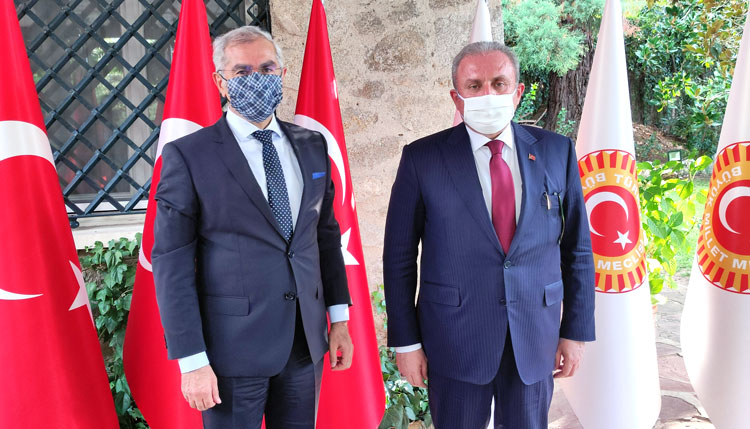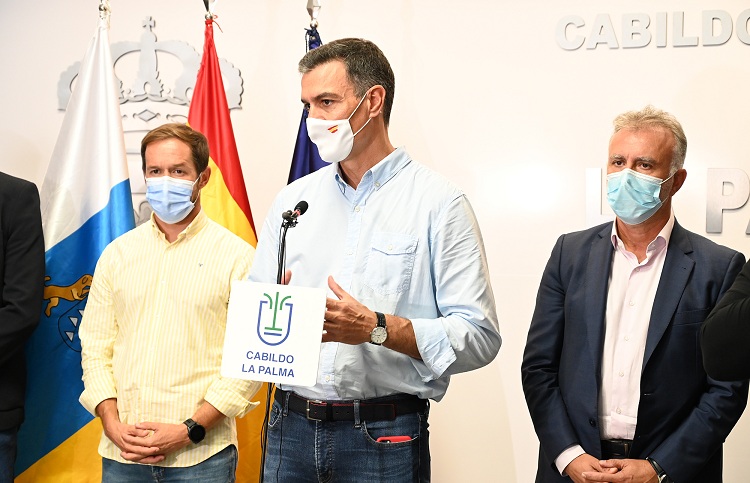Text and photos: Juan David Latorre.
Mustafa Sentop, President of the Turkish Grand Assembly, paid an official visit to Spain on Monday, during which he met with the Presidents of the Spanish Congress, Meritxell Batet, and the Senate, Ander Gil, and in which he criticised the delay in the arrival of EU aid for refugees in his country.
In a subsequent meeting with the press, Sentop took the opportunity to highlight the “unbeatable bilateral relations with Spain. This visit is important because both Spain and Turkey have very good relations with the will to deepen and intensify even more if possible in terms of inter-parliamentary relations between the two chambers of the two countries, since the last official visit of a speaker of the Grand Assembly was 27 years ago”.
As for trade relations with Spain, Mr Sentop said that “due to the pandemic they have slowed down a bit, but to pick up the previous momentum, our trade minister is going to visit Spain and the Spanish president, Pedro Sanchez, will attend the Spanish-Turkish summit on 17 November.”
“Relations between Spain and Turkey have a very deep past and history,” the Turkish politician continued. We have a signed friendship agreement signed more than 240 years ago, in 1782. Many countries today did not even exist at that time, and since then we have been improving our relations between the two countries every year. We have always been grateful for the Spanish Government’s stance in supporting Turkey’s membership of the European Union. In the early days of the pandemic when all countries were in need of medical supplies, Turkey did not hesitate for a moment to support and help Spain. Likewise, last summer we had very devastating forest fires and Spain was the first country in the European Union to help. Our friendship is not limited with agreements, but has become practical, with concrete deeds.”
“Both Spain and Turkey form bridge countries between continents, he said, Spain between Europe and Africa, and Turkey between Asia Europe and the Middle East area. We have many commonalities and many conflicts that we have to tackle together, which obliges us to work and collaborate closely. This relationship between countries must serve as a model for other countries to learn how to combat the global problems that affect us today. A clear example of this joint work has been the work carried out through the Alliance of Civilisations initiative, which has been an example of the concrete fruit of these relations”.
The President of the Turkish Grand Assembly expressed his “concern about the tone that Islamophobia and homophobia are taking. On the world map, we can say that our two countries that understand each other very well in these two areas.”
Regarding the migration agreement Turkey signed with the European Union to take in Syrian refugees and the latter’s possible request to take in refugees from Afghanistan, Mustafa Sentop stated that “I cannot say that all the points of the agreement signed in 2016 with the EU have been carried out. We have 4 million registered Syrian refugees in Turkey. We have been hosting them on our territory for ten years now. We provide them with shelter and all kinds of services, unlike in other countries. We offer them the same conditions in which Turkish citizens live. Not even a tenth of the aid agreed with the EU has arrived. I would be ashamed,” he said, referring to the EU’s role in the conflict.
“What happened in Afghanistan, who caused the situation of Afghan, Syrian or Iraqi refugees? We did not cause any conflict, we did not cause any wave of refugees. We are suffering the consequences of all these waves of displacement. Some countries think that the world is divided between those who have some missions and responsibilities and others who have rights and competences. The world cannot be divided in that way. All countries, depending on their economic power and the conditions they have, must assume their responsibility and their share of the conflict”.
Finally, Mustafa Sentop referred to his country’s dispute with Cyprus and the request of the Mediterranean countries to try to reach an amicable settlement. “We have to leave this matter in the hands of the people who live there, the Eastern Mediterraneans. Neither Greece nor France are in the Eastern Mediterranean, they have nothing to do with it. Everyone has to make do with what they are entitled to under international law. We have no intention or claim to anything that does not belong to us”.








